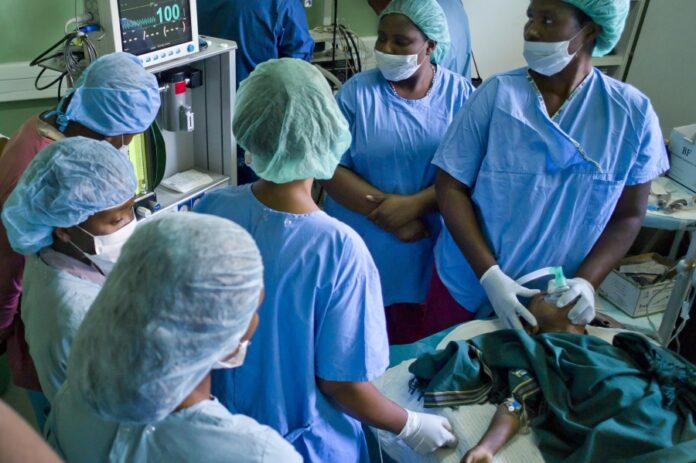A recent study by Ahmed, et al., (2024) titled “The availability, access, challenges, and advancements in neurosurgical care in Africa: A mini-review” published in Annals of Medicine and Surgery shows a critical shortage of neurosurgeons in Africa, less than 1% available to address 15% of the global neurosurgical disease burden.
Despite significant advancements in medical science, Africa continues to grapple with a substantial neurosurgical disease burden. The continent faces numerous challenges, primarily revolving around limited access to neurosurgical care and a severe shortage of neurosurgeons. The disparity in healthcare infrastructure across different regions exacerbates these issues, resulting in many patients not receiving the timely and specialized care they need. Conditions such as traumatic brain injuries, congenital anomalies, and spinal disorders remain inadequately addressed, leading to high morbidity and mortality rates.
“
There is severe neurosurgeon shortage, with less than 1% available to address 15% of global neurosurgical disease burden– Ahmed, et al., 2024
Efforts to bolster the neurosurgical workforce in Africa have seen some success, notably through initiatives like the World Federation of Neurosurgical Societies (WFNS) Rabat Training Center. This center plays a crucial role in enhancing local capacity by providing specialized training to neurosurgeons within the continent. However, the distribution of trained neurosurgeons remains highly uneven. Urban areas tend to have a higher concentration of specialists, leaving rural regions critically underserved. This imbalance underscores the need for more comprehensive strategies to ensure equitable distribution of neurosurgical expertise across all regions.
A significant impediment to effective neurosurgical care in Africa is the widespread lack of adequate facilities and equipment. Many hospitals and medical centers are not equipped with the necessary tools and technology to perform complex neurosurgical procedures. This infrastructure gap impacts the quality of care, often forcing patients to travel long distances to access the necessary services or, in many cases, forego treatment altogether. Addressing these deficiencies requires substantial investment in healthcare infrastructure, including the provision of state-of-the-art surgical equipment and the establishment of well-equipped neurosurgical units.
The delivery of neurosurgical care in Africa is also influenced by a range of socio-cultural factors. Geopolitical instability in certain regions poses significant challenges, disrupting healthcare services and displacing medical personnel. Additionally, cultural beliefs and practices can affect patients’ acceptance and understanding of neurosurgical interventions. For instance, in some communities, traditional healing practices may be preferred over modern medical treatments, or there may be stigma associated with certain neurological conditions. These cultural dynamics necessitate a culturally sensitive approach to healthcare delivery, with efforts to educate communities and integrate traditional practices with modern medical care where appropriate.
How the Study was Conducted
The authors employed a narrative review to provide an overview of the current state of neurosurgery on the continent. It identifies and analyzes the persisting challenges in neurosurgical care, such as workforce shortages and infrastructural deficits. The study synthesizes the recent advancements in surgical training, technology adoption, and international collaboration efforts across Africa.
What the Authors Found
The authors of the article on neurosurgical care in Africa found a critical shortage of neurosurgeons in Africa, with less than 1% available to address 15% of the global neurosurgical disease burden. The authors also found that many regions lack adequate neurosurgical facilities and resources, impacting the quality of care. Cultural beliefs and geopolitical instability affect the delivery and effectiveness of neurosurgical care.
Why is this Important
Public Health Impact: Neurosurgical diseases significantly affect public health, and understanding the challenges allows policymakers and healthcare providers to allocate resources effectively.
Addressing Disparities: By identifying workforce shortages and infrastructure gaps, interventions can be targeted to regions with the greatest need.
Improving Patient Outcomes: Enhancing neurosurgical care can lead to better patient outcomes, reduced disability, and improved quality of life.
Global Collaboration: The study emphasizes international collaboration and knowledge sharing to address common challenges in neurosurgery.
What the Authors Recommend
- The authors emphasize the urgent need to address the critical shortage of neurosurgeons in Africa. To achieve this, they recommend substantial investment in training programs, scholarships, and incentives aimed at attracting and retaining skilled professionals.
- To overcome the infrastructure gaps that hinder the quality of neurosurgical care, the authors recommend a focused allocation of resources to build and upgrade neurosurgical facilities
- The authors advocate for fostering international partnerships and creating networks to facilitate knowledge exchange and mentorship. These collaborations can significantly enhance the quality of neurosurgical care by sharing expertise and best practices.
- Recognizing the influence of socio-cultural factors on healthcare delivery, the authors recommend designing healthcare interventions that are culturally sensitive.
In conclusion, the study by Ahmed et al. highlights the pressing need to address the severe shortage of neurosurgeons and the significant infrastructural deficits in Africa. By investing in specialized training programs, enhancing healthcare facilities, and fostering international collaborations, there is potential to significantly improve neurosurgical care on the continent. Additionally, culturally sensitive approaches are crucial to overcoming socio-cultural barriers and ensuring that all communities benefit from advancements in medical science. Addressing these challenges is not only vital for improving patient outcomes and quality of life but also for reducing the substantial public health burden posed by neurosurgical diseases in Africa.
















 The African Research (AR) Index is a comprehensive scholarly directory and database focused explicitly on journal publishers that publish and disseminate African research.
The African Research (AR) Index is a comprehensive scholarly directory and database focused explicitly on journal publishers that publish and disseminate African research.

